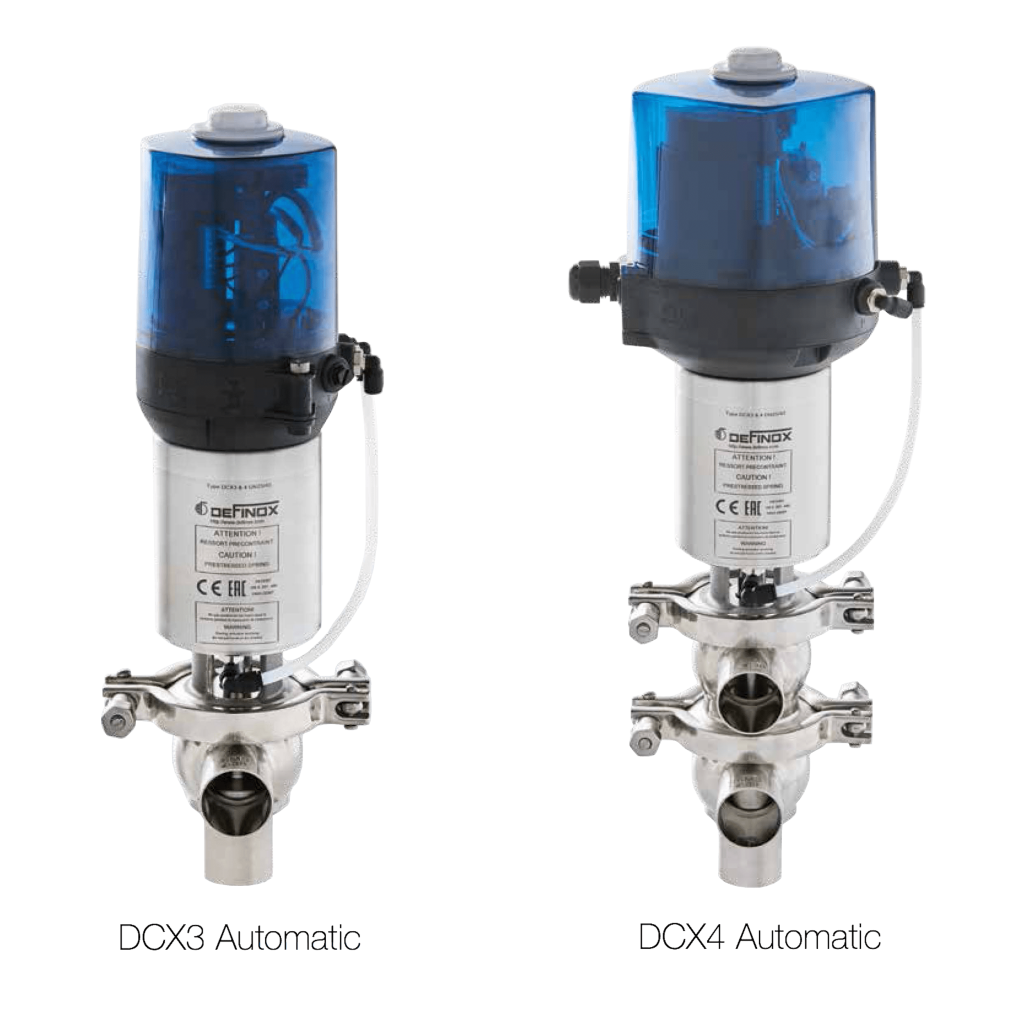Definox DCX3 – DCX4 Single Sealing Shut Off And Divert Flow Control Valves
DCX3 – DCX4 Single Sealing Shut Off and Divert Valves
SPECIFICATIONS
Size Range: 1/2” – 6”
Materials:
Body/Stem: 316L SS
Operator: 304 SS
Valve seals: PFA floating plug seal, FKM stem seal & body seal
Optional seals: EPDM, FKM, or Silicone plug seal, EPDM, FKM, or Silicone stem & body seal
Connections: OD tube butt weld, Sanitary clamp, Others upon request
Options: Long stroke for improved solids handling, Tangential bodies for horizontal installation, PTFE diaphragm type body seal for stem isolation
Signal Equipment: ICS Control top – valve sizes 1” – 3”, ACS Control top – valve sizes 4” – 6”, Network options: point-to-point & AS-i (others upon request)
Surface Finish: Ra Interior = 32Ra, Ra Exterior = 40-50Ra
Features:
- Patented PFA floating plug seal that is easily cleaned during CIP and offers outstanding sealing at high temperatures and excellent chemical resistance.
- Heavy-duty stainless steel pneumatic actuator that is capable of function changes: NO (Normally Open) – NC (Normally Closed) – DA (Double Acting).
- Clamp-style operator connection (manual and automated) for easy inspection and maintenance.
- Heavy wall machined spherical bodies guarantee excellent resistance to thermal expansion and contraction.
- Wide variety of body configurations: DCX3 (L) – (T) – (X) / DCX4 (L/L) – (L/T) – (T/L).
Service Conditions
Max. temperature: 284°F (depending on seal type)
Min. temperature: 23°F
Max. working pressure: 116 psi
Actuator air supply: 80 psi Minimum / 116 psi Maximum
Vacuum resistance: 0.4 cm3/s
Elastomeric Compounds:
Each of these materials has its own unique properties that allow them to provide long life and excellent service. Let’s have a quick look.
FDA FKM provides excellent resistance to a wide variety of chemicals. It is excellent for steam and widely used in the Pharma and Bioindustries. FKM also provides good resistance to micro-organisms, certain solvents, and ozone.
EPDM (Ethylene, propylene) materials offer excellent resistance to high temperatures ozone, weathering, and saturated steam, making them ideal for use with foods and pharmaceutical processes. Unsuitable for petroleum-based oils, mineral oil.
Food Quality Silicone materials provide excellent resistance to extreme weather conditions, ozone, oxygen, UV light, and moisture. It also offers resistance to bases and acids at average temperature and concentration. Weak mechanical properties limit its tensile, tear, and abrasion resistance.
Polytetrafluorethylene (PTFE) is actually a white polymer that is the most chemically resistant compound available and offers a wider range of temperatures than elastomers. It is resistant to most chemicals and solvents and its tensile strength makes it an excellent choice for applications that require a high occurrence of friction. Its very low compression set and its dimensional behavior limit its applications.
Perfluoroalcoxy (PFA)
Its color is also white and it’s considered a PTFE copolymer which has the same chemical properties, but a better dimensional behavior. PFA can replace elastomer seals but needs a special sealing design to suit its mechanical characteristics.
Another guiding principle in sanitary gasket selection should be “value in use”. Sanitary rubber components that are constructed of standard materials may suffice in a given production process but fail when exposed to higher temperature steam or caustic cleaning fluids. Sterilization processes used by food and pharmaceutical manufacturers frequently use steam, caustic chemicals, or a combination of both. Typically, the higher cost of a high-performance sanitary gasket or O-ring can be recouped many times over by its long service life. Selecting the proper elastomer can increase its mean time between failure, (MTBF) thereby preventing costly unscheduled downtime. Dangerous leakage and product contamination can also be eliminated by the selection of the optimum sanitary gasket or O-ring for the application.
